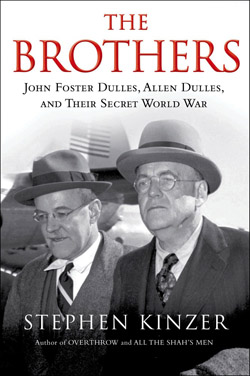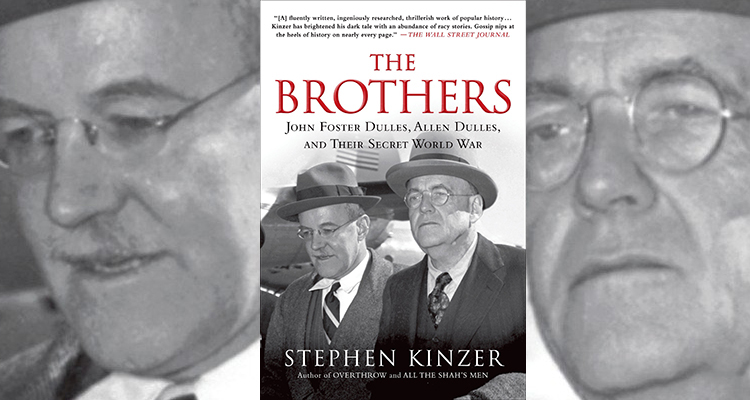 THE BROTHERS: John Foster Dulles, Allen Dulles, and Their Secret World War
THE BROTHERS: John Foster Dulles, Allen Dulles, and Their Secret World War
by Stephen Kinzer (Time Books)
In the 1950s President Dwight Eisenhower considered it America’s “destiny and duty” to contain the Soviet Union and the scourge of international communism. Eisenhower’s worldview was deeply influenced by two brothers who played paramount roles in his two administrations—John Foster Dulles, his secretary of state from 1953 until 1959, and Allen Dulles, the head of the CIA from 1953 to 1961. As author Stephen Kinzer points out in this astute and sobering book, the Dulles men together formed “a nexus of power unmatched in U.S. history.”
While in government the Dulles brothers were perceived mostly as exemplars of American virtue, but Kinzer pulls the cloak off their dark side. He reveals that the two men often used their powers for unwise and unsavory purposes—organizing coups and undermining democracies, all in the name of resisting Soviet ambitions. Kinzer asserts that “their reckless adventures palpably weakened U.S. security” and, in the long run, “did not work out well for the United States.”
Foster Dulles and his younger brother, Allen, were sons of a Presbyterian preacher and had illustrious relatives. Both a grandfather (John W. Foster) and uncle (Robert Lansing) held the office of secretary of state. The two men had very different personalities—Foster Dulles was a soft-spoken moralist while Allen was a jolly extrovert who “was never happier than when immersed in covert operations.” Still, they shared the same missionary zeal to fight the spread of communism—Foster overtly and Allen covertly—in various corners of the world, including places where the U.S.S.R.’s malign intentions were more imagined than real. Their paranoia “fit the age,” writes Kinzer, a former foreign correspondent for the New York Times.
As Kinzer explains, “The narrative of permanent danger was not fabricated—Soviet ambitions were real.” But the Dulles brothers “exaggerated the danger.” With his Manichean mindset, Foster Dulles denounced neutralism as immoral, and “he could not distinguish between indigenous nationalism and imported communism.”
Eisenhower authorized Allen Dulles to remake the leadership of suspect countries. His CIA organized coups that toppled elected leaders in Iran (1953) and Guatemala (1954), and schemed to depose the charismatic leaders of both Indonesia (Sukarno) and Cuba (Fidel Castro). Both of those latter efforts failed. Foster Dulles’ biggest miscalculation was in Vietnam. He refused to accept that Ho Chi Minh was too powerful to defeat. He and Allen opted to support South Vietnam and start a covert campaign to destabilize the North. “This was the moment at which United States involvement in Vietnam became a Dulles project. They persuaded Eisenhower. That set a fateful course.”
A bust of Foster Dulles was installed at Dulles International Airport in Chantilly, Va., which was named for him in 1962. Today, the bust has been relegated to a conference room opposite Baggage Carousel No. 3. Kinzer thinks it should be displayed more prominently so Americans can analyze the life of the secretary of state and ask themselves questions about their country’s global role. “Rather than forget or vilify [the Dulles brothers], Americans should embrace them. Their stories are full of deep meaning for the United States. They are us. We are them.”
—Richard Ernsberger Jr.





